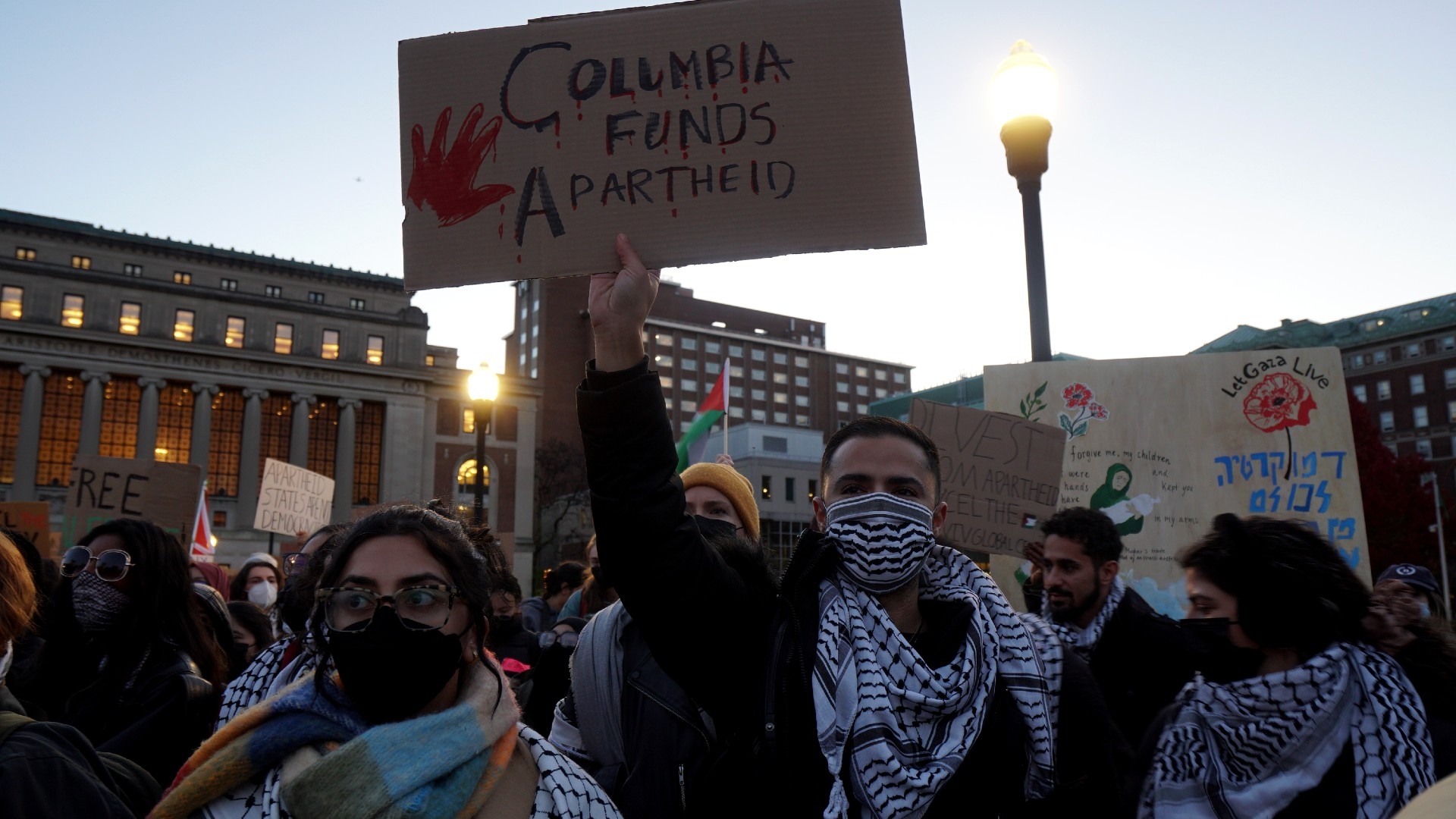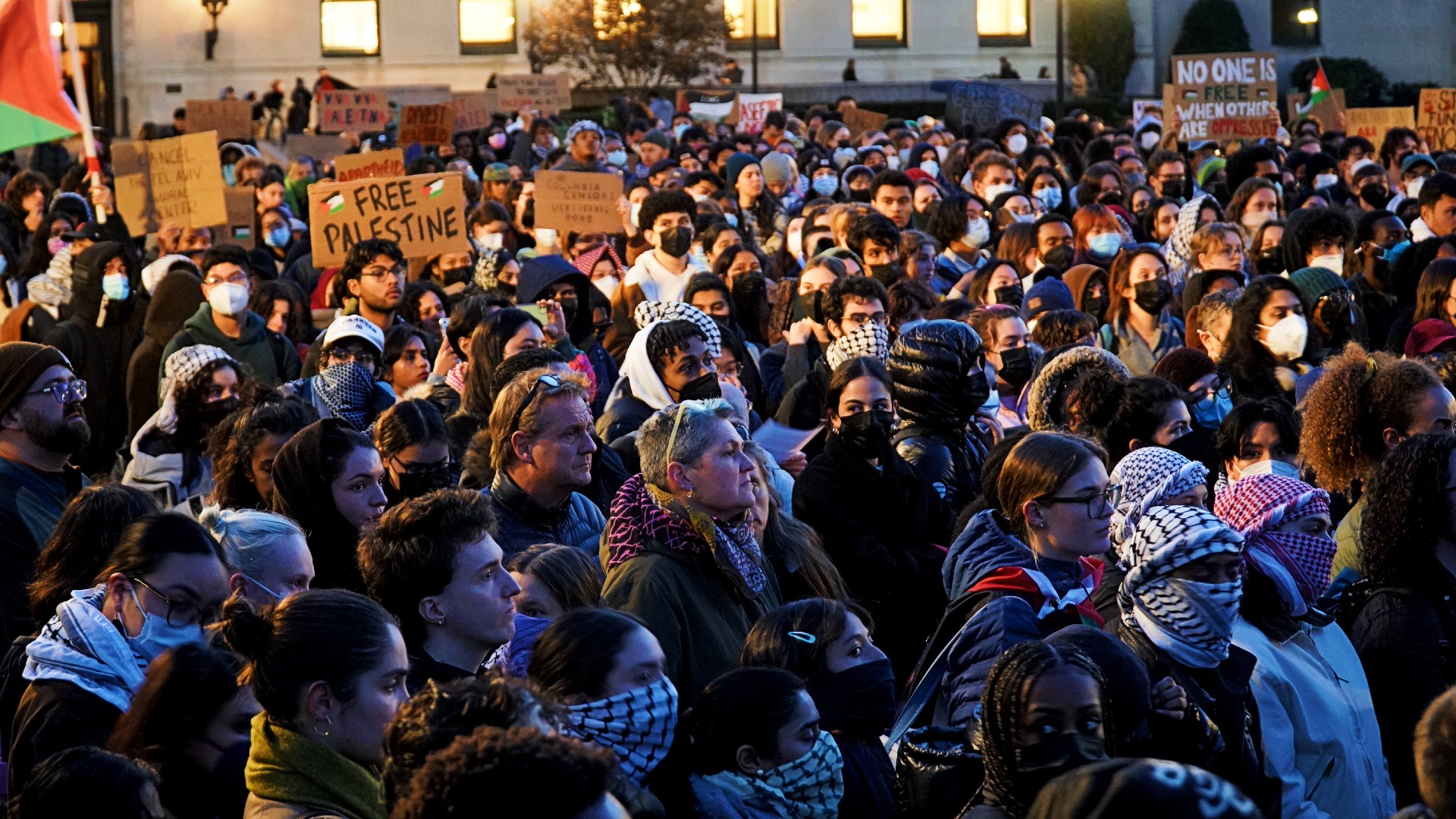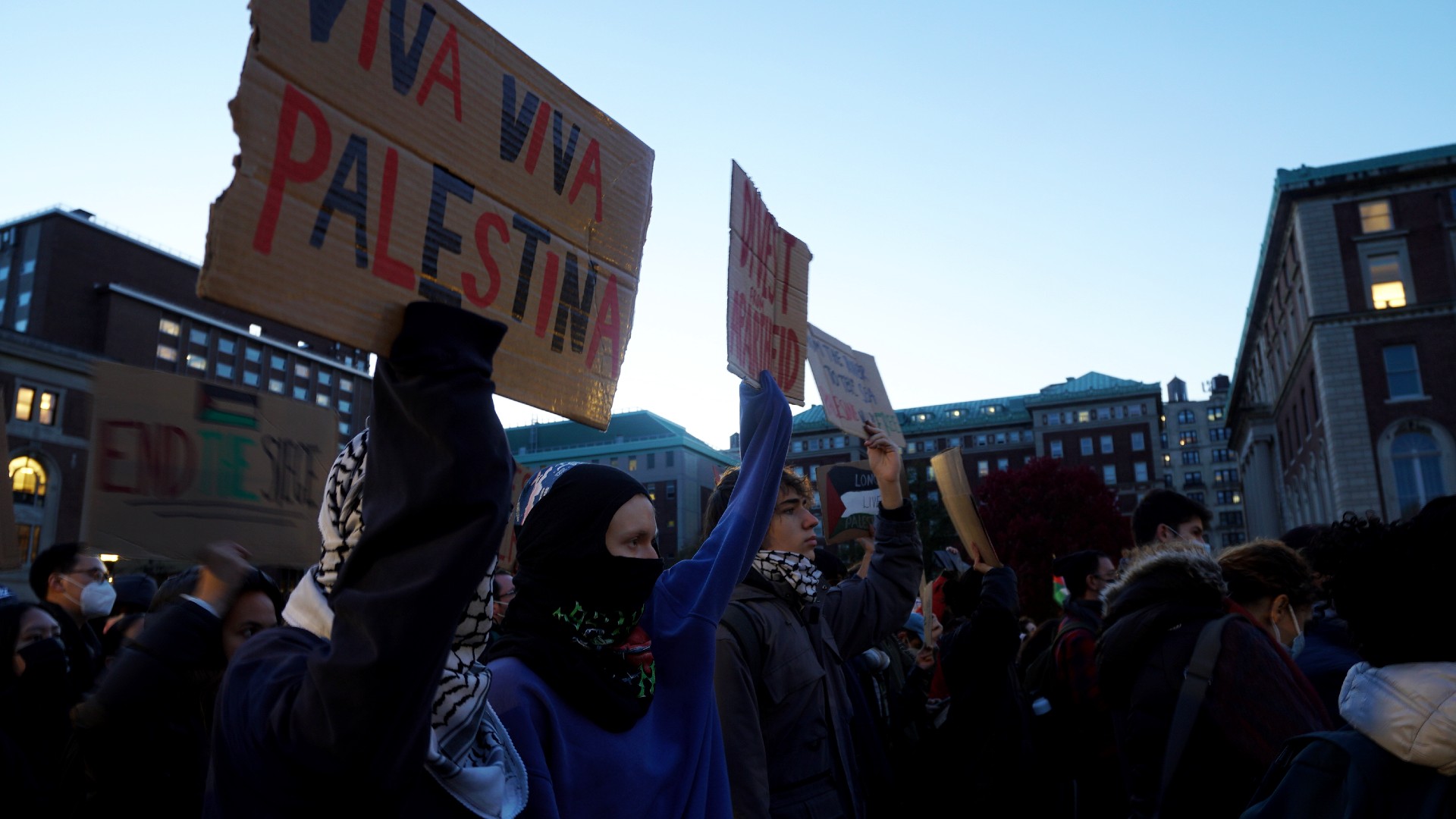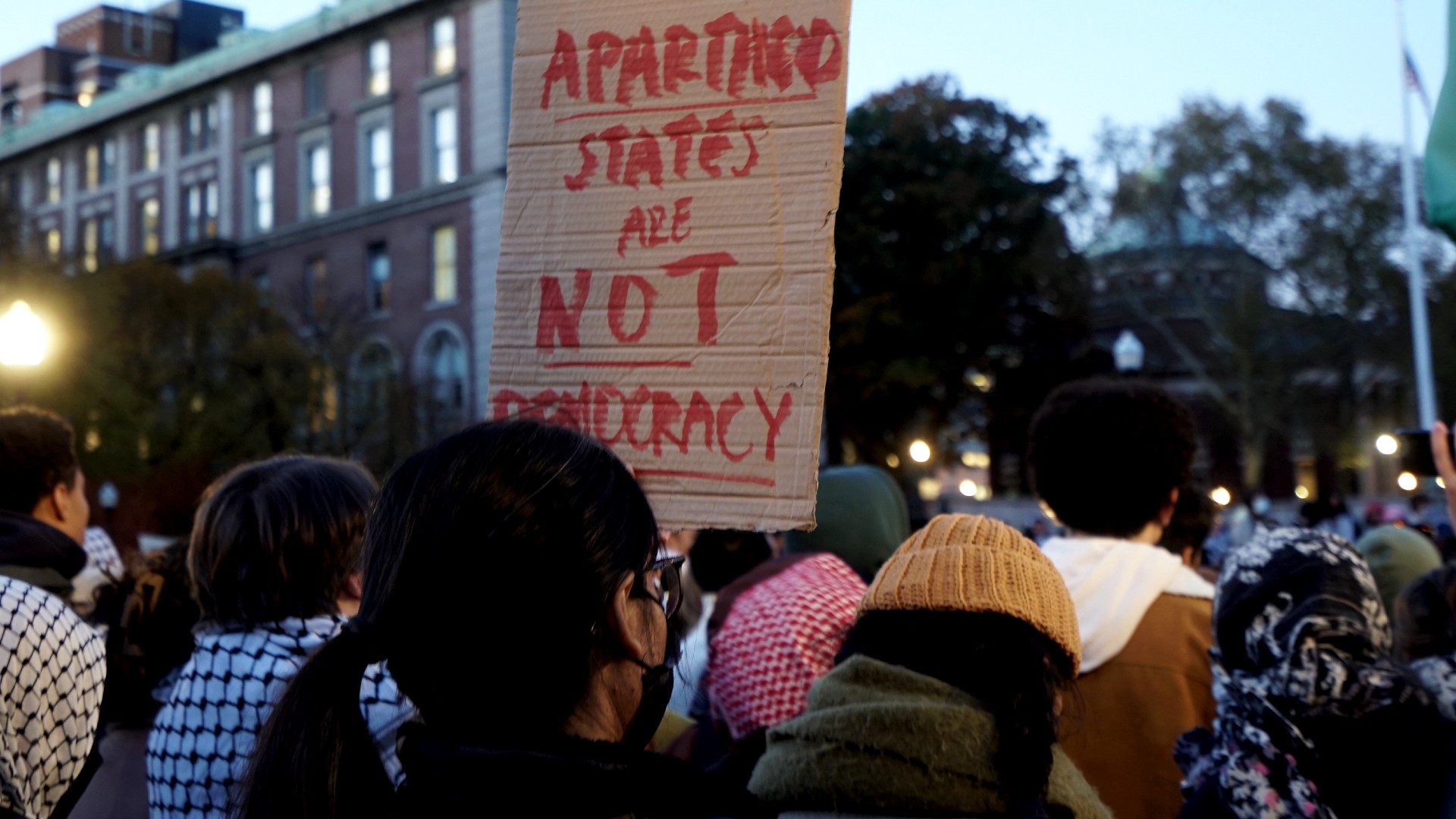Israel-Palestine war: Columbia students demand reinstatement of pro-Palestine groups
Several hundred students and alumni say one side is being silenced and described ban on pro-Palestinian groups as antithetical to university values

It was an evening of fiery speeches and collective relief.
After weeks of harassment, doxxing, and intimidation from pro-Israel students and external Zionist groups, two young women at Columbia University said they'd had enough.
Addressing a crowd of no less than 500 students and faculty assembled outside the Butler Library on Tuesday evening, the duo, draped in keffiyehs and with masks over their faces, announced to the crowd: "We stand here as proud members of SJP (Students for Justice in Palestine). And we are here to tell you that we are done hiding."
They ripped off their masks and flung them into the crowd.
"Why should advocates of ethnic cleansing be able to shamelessly proclaim their support for genocide, while we are forced to mask for simply calling for the liberation of a colonised people living under brutal occupation?" the two women, one Palestinian, and one Kashmiri, but both named Maryam, said.
During a series of thoughtful but not atypical speeches about the violence unfolding in Gaza under Israeli air strikes, and the university administration's attitudes towards Palestinians - which included banning both the SJP and a student chapter of Jewish Voice for Peace (JVP) - the two young student activists cut through the tension in a single stroke.
The long shadow of constant surveillance, exaggerated police presence, and serial intimidation that had hovered over the activities of SJP as well as pro-Palestinian activists for the past month had, for a moment, lifted.
"In an attempt to shut us down, you have only made us stronger. The student groups on campus have mobilised at unprecedented levels to support us in the struggle for Palestinian liberation that they all fully see as their own struggle too," Maryam, the Kashmiri-American student, said.
The crowd roared in approval. Destiny had been wrestled back into their hands.
Tensions at the university had been simmering for over a month since Israel's war on Gaza erupted. But in recent days, they reached fever pitch after administrators suspended both SJP and JVP for the rest of the semester after the two groups participated in a nationwide student walk-out the day prior.
Hamas and armed Palestinian groups launched an attack on Israel on 7 October, during which around 1,200 Israelis were killed and around 240 were taken hostage, according to the official tally from the Israeli government. In response, Israel has been bombing the besieged Gaza Strip since.
Israel's assault, which has included a weeks-long aerial bombardment campaign followed by a ground incursion into Gaza, has killed more than 11,000 Palestinians, 70 percent of whom are women and children.
The fallout from the war has been playing out on several elite US campuses where pro-Palestinian student activists have found themselves facing off with university administrations firmly aligned with the Israeli state.
Explaining the decision made on 10 November, Columbia's special committee on campus safety described the groups as having "repeatedly violated university policies related to holding campus events, culminating in an unauthorized event Thursday afternoon [9 November] that proceeded despite warnings and included threatening rhetoric and intimidation".
The ban means that the two groups would neither receive university funds to operate nor would they be allowed to conduct any activities on the campus.
Columbia University did not immediately reply to MEE's request for comment.
Taking sides
The censuring of the two pro-Palestinian organisations has resulted in a series of competing letters and petitions. Hundreds of pro-Israel alumni have welcomed the move.
However, several hundred current students and faculty at Columbia, including Jewish academics, condemned the suspension, pointing out that only one side was being silenced and described the actions as antithetical to the values of the university.
The decision comes off the back of several complaints from billionaire donors across the elite university landscape which have called for pro-Palestine protests to be shut down, drawing severe criticism and raising uncomfortable questions from students over the role of big money in university affairs.
For instance, on 30 October, the billionaire Henry Swieca resigned from the business school board, describing the university as being home to "blatantly anti-Jewish student groups and professors" who "operate with complete impunity".
Students said that that was ironic, as it was only pro-Palestinian students and their groups that were being targeted by the university.
'To Columbia, we say: you may have shut down SJP and JVP, but you can't shut down the movement for Palestinian liberation'
- Maryam, Students for Justice in Palestine
One Jewish student said the implication of suspending JVP on campus meant that the administration was sending a message that only pro-Israel Jewish organisations were welcome at the university.
"If Columbia cared, they would listen when we tell them that anti-Zionist Jews do not feel safe on this campus to practise their religion on spaces they provide," the student said.
"When Columbia speaks of Jewish safety, it seems that they only mean to protect Jewish students who support Israel or are silent in their dissent," the student added.
This decision, the student said, reinforced the notion that Jewishness and Israel were synonymous.
Both the SJP and JVP said the ban sets a dangerous precedent and indicated the extent to which Columbia University was invested in Israel.
They said they would not back down.
Tuesday's protest, organised by Columbia’s Palestinian student union (Dar), and endorsed by almost a dozen other student groups, was followed by the launch of a coalition calling for the university to divest from Israel.
The coalition specifically called for the university to cancel the opening of the Tel Aviv Global Center, noting that Israeli apartheid policies would exclude Palestinian affiliates of Columbia from the centre, in violation of the university's own policies. The coalition further called on administrators to cancel the dual-degree partnership with Tel Aviv University.
It builds on the work that began in 2016 by the Columbia University Apartheid Divest (CUAD) campaign that managed to push through a student resolution in September 2020, which agreed on divesting from Israel. At the time, 61 percent of the student body voted in favour of it.
In 1985, Columbia University became the first to divest from apartheid South Africa. Students said they would work to ensure that Columbia becomes the first to divest from Israel, too.
Security spectacle
Earlier on Tuesday, the New York Police Department turned the famous Morningside Heights campus into a fortress. Police officers lined the street outside the campus, and created a defacto checkpoint at each entry point.
No one without a Columbia ID card was allowed in, the press had to register in advance and were told they would be escorted into the campus.
As the rally continued into the evening, a helicopter hovered in anticipation.
The security spectacle, students remarked, was part of an attempt to paint pro-Palestine students as criminals and as troublemakers about to go on a rampage. They argue it was an attempt to distract from the acts of intimidation and harassment exercised by pro-Israeli students and faculty towards pro-Palestinian students, in particular Arab and Muslim students.
Tuesday evening's proceedings were not without opposition.
As pro-Palestinian students raised flags, held banners and chanted slogans, a handful of students draped in Israeli flags stood on the periphery, mocking and jeering at the speakers and labelling them "Hamas".
Other pro-Israel students periodically walked behind the speaker's podium and played loud music on bluetooth speakers to distract and disrupt the meeting.
Later, as a Palestinian addressed the crowd and choked up as she expressed horror over the ongoing killings of Palestinians in Gaza, a pro-Israel supporter turned up the music on his Bluetooth speaker and danced mockingly behind the podium.
Protesters looked on incredulously until a crowd marshall convinced him to stop his disruptive dance.
"For as long as I can remember, every time Gaza was bombed, there was radio silence from those around me. People did not even know the difference between Palestine and Pakistan.
"This wave of mobilisation and awareness is a turning point for the Palestinian liberation movement. This is a moment that will go down in history," Maryam, the Kashmiri-American student from SJP, said.
Maryam says that this moment requires an urgent call for solidarity.
"To Columbia, we say: you may have shut down SJP and JVP, but you can't shut down the movement for Palestinian liberation. The masses are now awake.
"What happens next will set the precedent not only for free speech on college campuses but the entire movement in America for Palestinian liberation," Maryam added.
https://www.middleeasteye.net/news/israel-palestine-war-columbia-university-students-demand-reinstatement-pro-palestine-groups




0 Comments:
Post a Comment
Subscribe to Post Comments [Atom]
<< Home